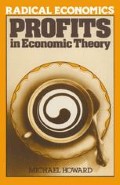Abstract
Effective demand theory has devoted very limited attention to the analysis of profit. It has been more concerned with establishing the coherence of its key concepts and utilising them to tackle employment problems. Nevertheless, the basic implications which variations in the level of effective demand have for total profits are easily deduced, as we have already seen in Chapter 16. These can be extended somewhat by using the work of Robinson.1 She has very specific views concerning both the limitations of neoclassical economics and the nature of Keynesian theory. However, the models of profit determination which she has developed can be formulated sufficiently broadly as to accommodate alternative perspectives on both these matters.2
Preview
Unable to display preview. Download preview PDF.
Author information
Authors and Affiliations
Copyright information
© 1983 Michael Howard
About this chapter
Cite this chapter
Howard, M. (1983). Effective Demand and Profit in the Short Period. In: Profits in Economic Theory. Radical Economics. Palgrave, London. https://doi.org/10.1007/978-1-349-17142-2_18
Download citation
DOI: https://doi.org/10.1007/978-1-349-17142-2_18
Publisher Name: Palgrave, London
Print ISBN: 978-0-333-32166-9
Online ISBN: 978-1-349-17142-2
eBook Packages: Palgrave Economics & Finance CollectionEconomics and Finance (R0)

